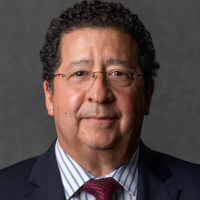The Gulf, Iran, and Future Oil Geopolitics
Four experts shared their analysis on the current and future state of oil in the Middle East.
On June 22, 2016, the Middle East Program at the Wilson Center hosted the event “The Gulf, Iran, and Future Oil Geopolitics” with David Goldwyn, President of Goldwyn Global Strategies; Douglas Hengel, Senior Resident Fellow at the German Marshall Fund; Elizabeth Rosenberg, Senior Fellow and Director of the Energy, Economics, and Security Program at the Center for New American Security; and Jean-Francois Seznec, Non-Resident Senior Fellow and Director at the Atlantic Council’s Global Energy Center. Jan Kalicki, Global Fellow at the Wilson Center and Senior Fellow at the Watson Institute for International and Public Affairs at Brown University, moderated the discussion, and Henri J. Barkey, Director of the Middle East Program at the Wilson Center, provided introductory remarks.
Kalicki began by noting the conversation would focus on three sets of issues: oil production and prices, national oil policies, and the broader geopolitical implications of these factors.
Rosenberg commented on Iran, focusing on the Iran nuclear deal’s impact on the country’s economy and oil production. She explained that Iran has surpassed analysts’ expectations for oil production, which has returned to the levels it was five years ago before the implementation of the most restrictive sanctions. Rosenberg stressed that Iran will not be able to sustain this rapid increase in production without foreign direct investment but that one of the most significant impediments to locking down contracts is inter-governmental feuding about giving up the country’s oil wealth to foreign investors.
Goldwyn commented on the current and future challenges that Iraq faces in oil production. He predicted that Iraq’s political situation will pose a threat to maintaining current levels of production, despite a record year. Goldwyn explained that the country faces numerous chronic problems including a weak government, sectarian issues, the ripple effect of low oil prices, and an extremely expensive war. The war, he said, has also contributed to the loss of investors in the Kurdistan region, which was once considered a bastion of stability. Despite these seemingly insurmountable challenges, Goldwyn believes a loan from the IMF could be a potential yet difficult path forward.
In his remarks, Seznec highlighted the many economic shifts occurring in Saudi Arabia, which are largely attributable to the country’s new king, Salman bin Abdulaziz Al Saud. He explained the king’s newly appointed oil minister, Khalid al-Falih, has been tasked with executing the “Vision 2030” plan, which aims to reduce Saudi Arabia’s economic reliance on oil production. Most of the plan’s development, according to Seznec, will occur through the private sector. He stated that a major aspect of this plan entails the privatization of 5 percent of Saudi Aramco, valued at $2 trillion. Seznec said that the King’s decision to privatize Saudi Aramco is part of an effort to create greater transparency in order to deter public unrest. The extremely popular Deputy Crown Prince Mohammad bin Salman is playing a leading role in the economic shakeup, and has received substantial support from the Saudi population. Seznec stressed that while Saudi Arabia is attempting to diversify its economy, the country will not stop producing oil and will maintain its position as a major player in OPEC.
A major theme in Hengel’s broader geopolitical analysis was the high level of uncertainty regarding the future of the oil market. He posed the questions: is the oil market going to rebalance? Is the current situation something cyclical, or has there been a fundamental structural change? He explained the U.S. demand for oil is increasing, and climate change could also play a role in changing the balance of the oil market. Hengel predicted that the United States will become even more dependent on the Middle East for oil in the future, and as a result the United States will need to work on constraining demand and focus on developing newer and safer oil producers.
Kalicki then mentioned the assumption that there will be continued tensions between Iran and Saudi Arabia. Rosenberg said it is likely that competition, not confrontation, will develop, and Seznec indicated there are a number of opportunities for Saudi-Iranian economic cooperation. Kalicki concluded by stating that the issues discussed during the panel will be pertinent in the Middle East for years to come.
By Danielle Recanati, Middle East Program
Speakers


Former Counselor for International Strategy, Chevron; Chairman, Eurasia Foundation
Hosted By

Middle East Program
The Wilson Center’s Middle East Program serves as a crucial resource for the policymaking community and beyond, providing analyses and research that helps inform US foreign policymaking, stimulates public debate, and expands knowledge about issues in the wider Middle East and North Africa (MENA) region. Read more
